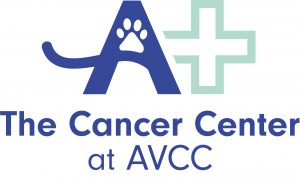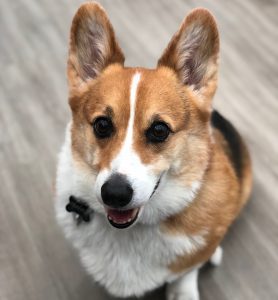
Canine lymphoma is one of the most common cancers in dogs. It is a cancer of a type of immune system cell (lymphocyte) and lymphoid tissues present in the body. This includes the lymph nodes, spleen, gastrointestinal tract, thymus and bone marrow. However, they may arise in almost any tissue in the body.
The cause of canine lymphoma is likely multifactorial and largely unknown. Lymphomas are classified based on their anatomic location, histologic criteria and immunophenotypic characteristics. The most common anatomic locations are multicentric, gastrointestinal, mediastinal and cutaneous forms. Greater than 80% of dogs with lymphoma develop the multicentric form. This is usually characterized by the presence of peripherally enlarged lymph nodes.
Signs of Canine Lymphoma
Some dogs do not feel sick or exhibit only mild signs of illness at the time of diagnosis. Others may experience more marked clinical signs including: lethargy, weight loss, nausea, vomiting, diarrhea, excessive thirst, urination, weakness or at times difficulty breathing.
Evaluating Canine Lymphoma
A complete evaluation of a dog suspected of having lymphoma involves a fine needle aspirate of the peripheral lymph nodes and full blood work evaluation. Additional staging diagnostics recommended in order to determine the extent of a patient’s disease include: thoracic radiographs (chest x-rays), abdominal ultrasound, and flow cytometry (to determine if B or T cell in origin). Lymphomas can be further subdivided into two main classifications: large cell/high grade vs small cell/low grade and B-cell vs T-cell. The most common form of canine multicentric lymphoma is large cell/high grade lymphoma most commonly of B-cell origin. Lymphoma is a systemic disease and the mainstay of treatment is chemotherapy.
Treating Canine Lymphoma
The standard of care for intermediate to high-grade lymphoma consists of a multidrug agent protocol referred to as CHOP. This incorporates injectable and oral drugs (vincristine, cyclophosphamide, doxorubicin and prednisone). Each drug works in a different way to kill the lymphoma cells. Drugs are alternated to prevent or delay the onset of lymphoma cell resistance and reduce the incidence of side effects.
Our CHOP protocol is given over the span of 25 weeks for a total of 4 cycles. The first 2 cycles are given weekly with one-week break after each doxorubicin and the remaining 2 cycles every other week. Lymphoma is not curable. However, it is often manageable for a period of time. Approximately 80 to 90% of dogs with multicentric lymphoma will respond (go into clinical remission) to a multi-drug chemotherapy protocol. A remission is not a cure. But rather, it represents the temporary disappearance of clinically detectable cancer.
Each patient is an individual. Survival times vary depending upon a multitude of factors. This includes the cell type, grade, stage and a patient’s response to therapy. The median survival time for dogs with multicentric disease treated with CHOP chemotherapy protocol is 10-12 months. A few of these treated dogs may live 2 years or possibly longer. Some animals, unfortunately, have resistant cancers and respond for shorter periods of time or do not respond at all.
Check out The Cancer Center at AVCC’s Comprehensive Guide to Pet Cancer here.
The Cancer Center at AVCC is located in South Florida in Broward County.
8920 W. State Road 84
Davie, Florida 33324
954-500-8387
The Cancer Center at AVCC offers the following oncology services:
Diagnostic tests including:
- Fine needle aspirates/cytology
- Bone marrow aspirates
- Bone biopsies
- Incisional and punch biopsies
- Personalized genomic testing
Treatment:
- Traditional chemotherapy (intravenous/intracavitary)
- Metronomic chemotherapy
- Targeted chemotherapy
- Immunotherapy
- Palliative care and pain management
- Hospice counseling
- Nutritional counseling and referral
- Referral for pet radiation therapy
